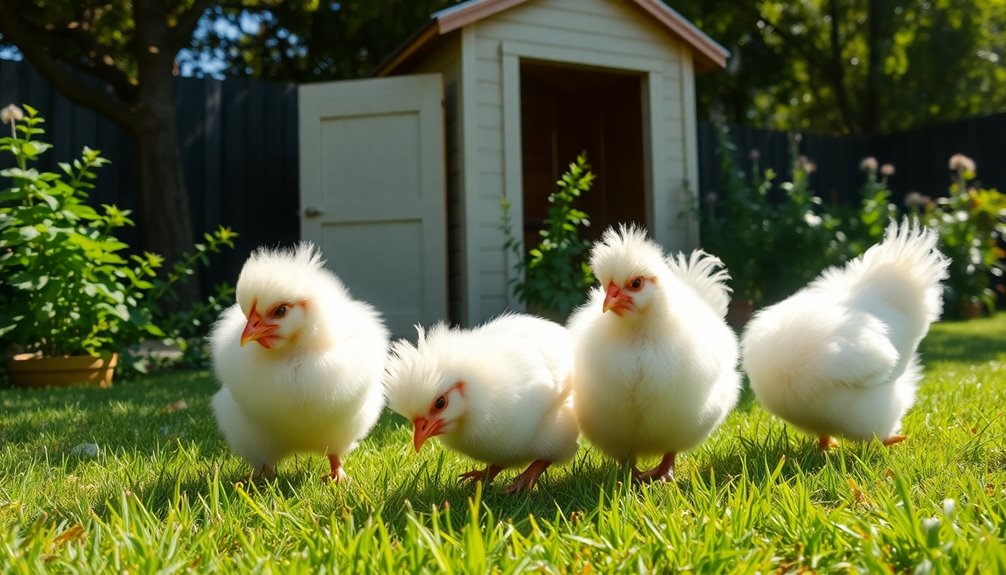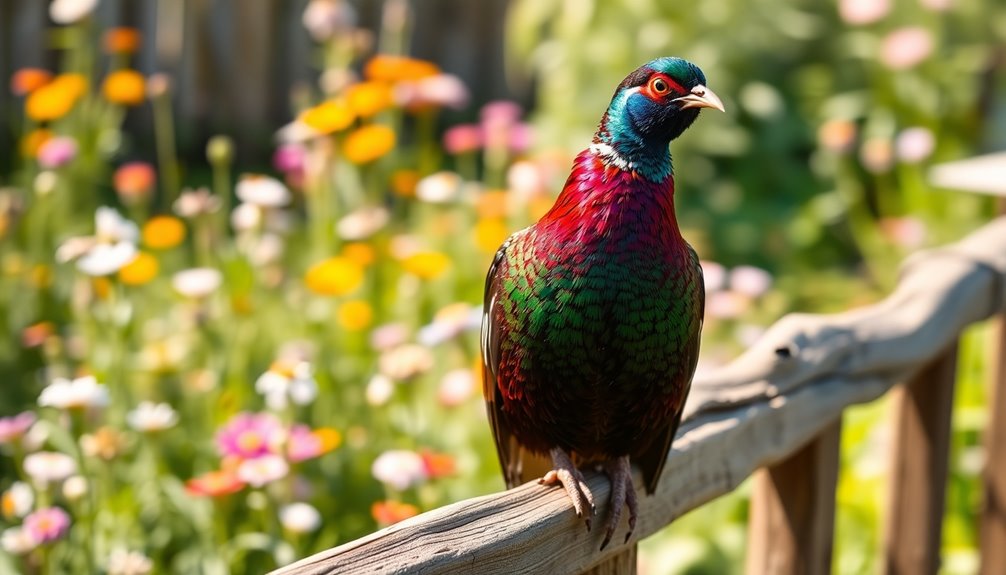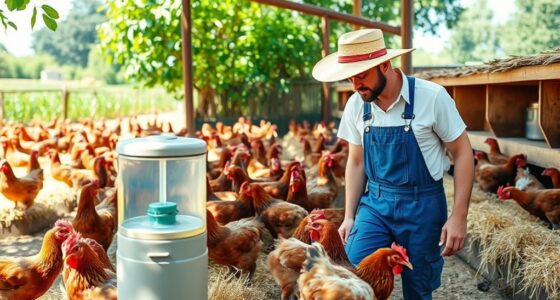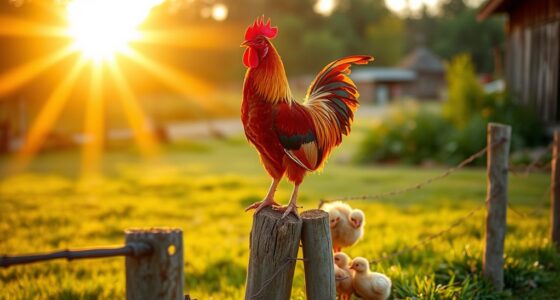Raising Silkie chickens can be a delightful adventure. Start by providing a balanced diet with appropriate protein levels for their growth stage. Keep their living space clean and spacious, ensuring 3-4 sq. ft. per bird inside the coop. Silkies thrive on interaction, so spend time with them to build trust—use treats like cheese balls to reinforce positive behaviors. Monitor their health regularly to catch any issues early. For breeding, their natural instincts work wonders, but keep an eye on humidity levels for hatching. There's much more to explore about keeping these charming birds happy and healthy!
Key Takeaways
- Provide a balanced diet with appropriate protein levels: Starter (21%), Grower (18%), and Layer feeds (16%) to ensure optimal growth and egg production.
- Maintain clean living conditions and proper ventilation in the coop to reduce stress and promote good health for your Silkies.
- Regularly check for pests like lice and mites, and vaccinate day-old chicks against Marek's Disease to prevent common health issues.
- Encourage bonding through gentle handling and positive reinforcement, using treats like cheese balls and lettuce to build trust.
- Utilize community resources, such as local clubs and online forums, for support, advice, and networking with other Silkie enthusiasts.
Overview of Silkie Chickens
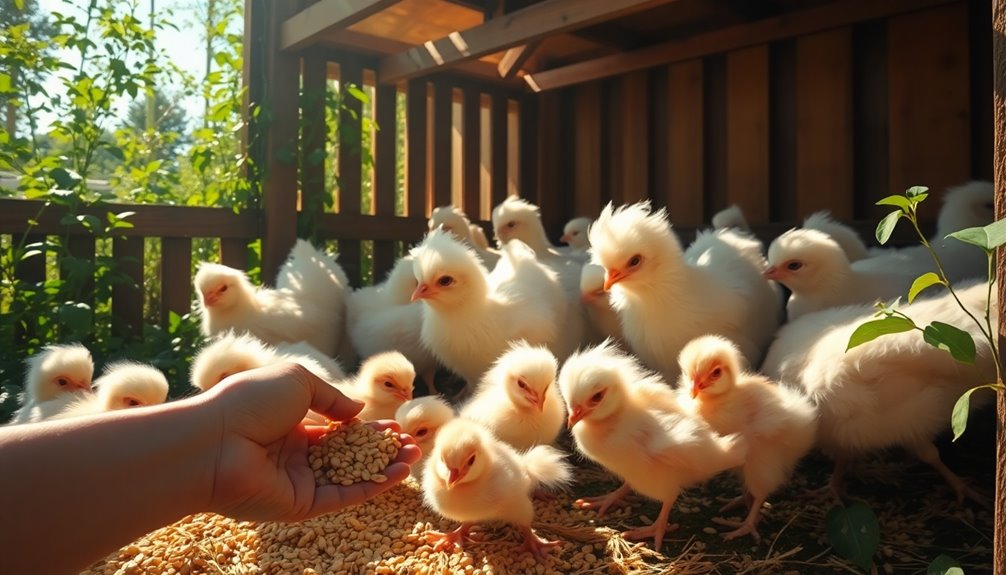
Silkie chickens are one of the most unique and charming breeds you'll encounter. Originating from Southeast Asia, particularly China, these birds are easily recognized by their soft, fluffy feathers that resemble silk.
Silkie hens stand out with their striking physical traits, including black skin, blue earlobes, and feathered feet. You'll appreciate their friendly, docile temperament, making them excellent pets for families and children alike.
While they're not prolific layers—producing only 100 to 120 small eggs annually—Silkies shine as devoted broody hens. They often incubate eggs from other birds, typically handling a clutch size of 5 to 10 eggs with a 21-day incubation period.
Care and Health Guidelines
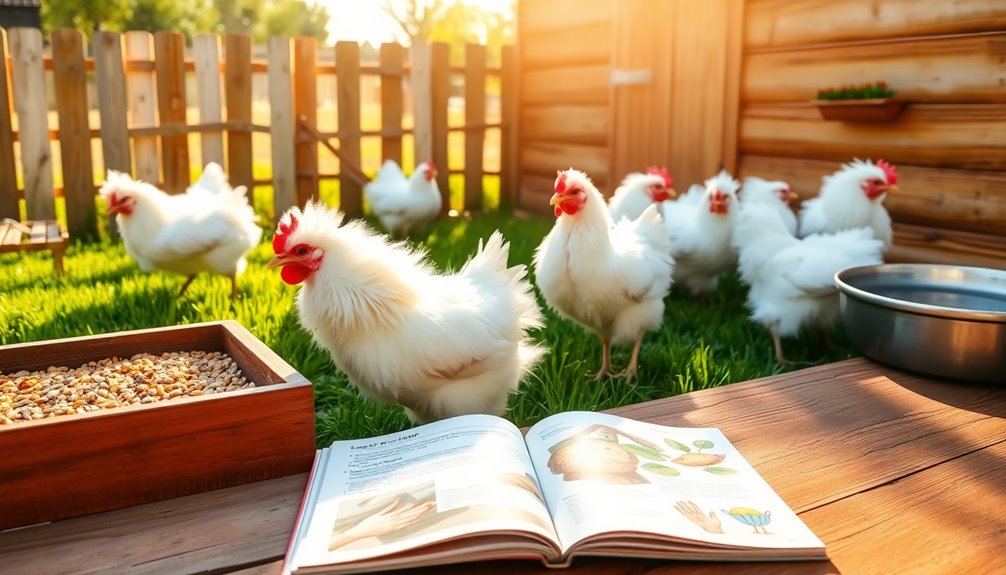
To keep your Silkies healthy and thriving, you'll need to focus on their nutritional requirements and be aware of common health issues.
Regular health checks are essential, as these birds can be prone to pests like lice and mites.
Nutritional Requirements
When raising Silkies, it's crucial to provide a balanced diet that supports their growth and health. A proper diet helps prevent health issues and guarantees they thrive.
Here's what you should include:
- Starter Feed: Use 21% Starter Feed for chicks until they're 8 weeks old.
- Grower Feed: Shift to 18% Grower Feed until they start laying eggs.
- Layer Feed: Once they lay their first egg, switch to 16% Layer Feed to provide the necessary calcium for strong eggshells.
- Treats: Offer Scratch Grains and Oyster Shell as occasional treats, but keep it limited to avoid health issues.
Always confirm fresh water is available, promoting hydration and overall well-being in your Silkies.
Common Health Issues
Providing a balanced diet plays a significant role in your Silkies' overall health, but being aware of their common health issues is just as important.
Silkies are particularly susceptible to Marek's Disease, so vaccinating day-old chicks is essential to prevent nerve inflammation and paralysis. Regularly inspect your chickens for lice and mites, as their fluffy feathers can hide infestations. Keeping the coop clean helps mitigate this risk.
You might also need to trim their feathers to guarantee they can see clearly, promoting better hygiene and health. During winter, provide a heat source since Silkies are more vulnerable to cold due to their unique feathering.
Finally, maintain proper nutrition to support their overall well-being.
Regular Health Checks
Regular health checks are essential for maintaining the well-being of your Silkies, as these fluffy birds can easily hide health issues beneath their dense feathers.
To guarantee your Silkie chickens stay healthy, focus on the following:
- Inspect feathers and skin regularly for signs of lice or mites; early detection is key.
- Monitor their behavior to catch any changes that might indicate health problems.
- Provide a balanced diet rich in protein, seeds, grains, and vegetation to support their overall health.
- Implement routine worming and vaccinations to prevent diseases like Marek's Disease.
Personality and Temperament
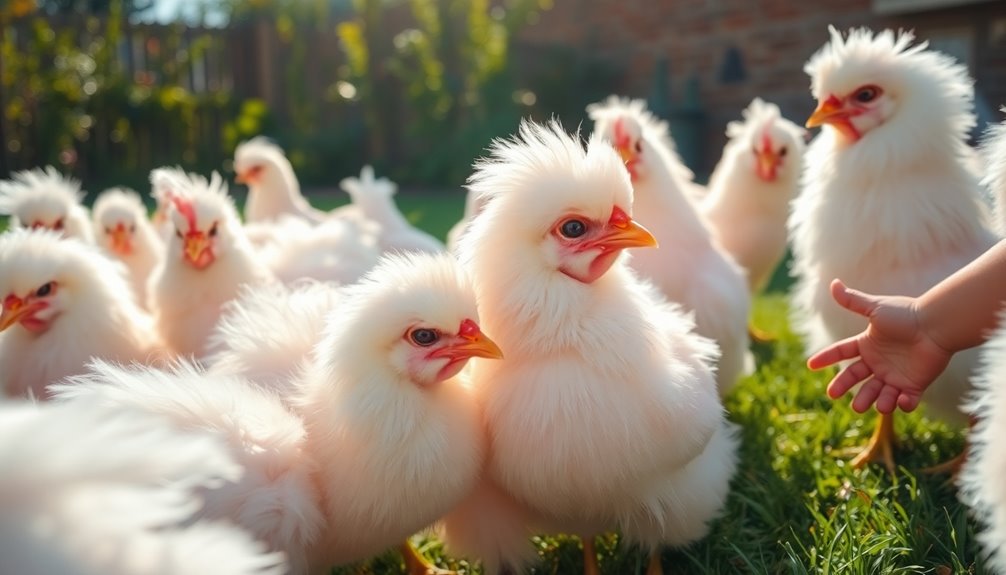
When you raise Silkies, you'll quickly notice their friendly and docile nature, making them perfect companions for families.
Their strong maternal instincts shine through as they often care for eggs from other birds, showcasing their nurturing side.
Plus, their quiet demeanor means they won't disturb your peace, allowing you to enjoy their company without excessive noise.
Friendly and Docile Nature
Silkies stand out not just for their unique appearance but also for their friendly and docile nature, making them ideal companions for families.
Their gentle temperament allows for easy handling, especially with children. You'll find that:
- Silkie chicks are incredibly affectionate and thrive on human interaction.
- Their calm demeanor means they rarely create a fuss, only vocalizing during egg-laying or when threatened.
- Silkies love companionship, making them perfect for backyard flocks.
- They often go broody, showcasing their nurturing instincts, and are wonderful mothers to their chicks or even to those of other birds.
With their soft personalities and striking looks, Silkies truly enrich your family environment.
Strong Maternal Instincts
Beyond their friendly and docile nature, Silkies shine as remarkable mothers. Their strong maternal instincts set them apart, as they often prefer to incubate their own eggs rather than relying on artificial methods.
You'll notice their broody behavior, where they frequently sit on a clutch of eggs, sometimes even adopting eggs from other birds. A Silkie hen typically manages a clutch size of 5 to 10 eggs, displaying attentive and protective care once the chicks hatch.
Their gentle demeanor makes them excellent caretakers, minimizing the risk of harm to their young. By providing a suitable environment and the chance to raise their own chicks, you can harness their natural inclination to brood, ensuring healthy and thriving offspring.
Minimal Noise Production
Enjoying a serene backyard experience is easy with Silkies, thanks to their minimal noise production. These charming silkie hens are perfect for families, ensuring a peaceful environment.
Here are a few reasons why their gentle temperament makes them ideal pets:
- Quiet Nature: Silkies rarely produce loud sounds, except when laying eggs or feeling threatened.
- Calm Demeanor: Their affectionate nature fosters easy bonding with humans without excessive vocalization.
- Urban-Friendly: Their minimal noise level makes them suitable for urban or suburban living, where noise restrictions may apply.
- Family-Friendly: With their gentle temperament, Silkies are less likely to disturb neighbors, making them excellent companions for children.
Choose Silkies for a tranquil and delightful backyard experience!
Breeding and Incubation Tips
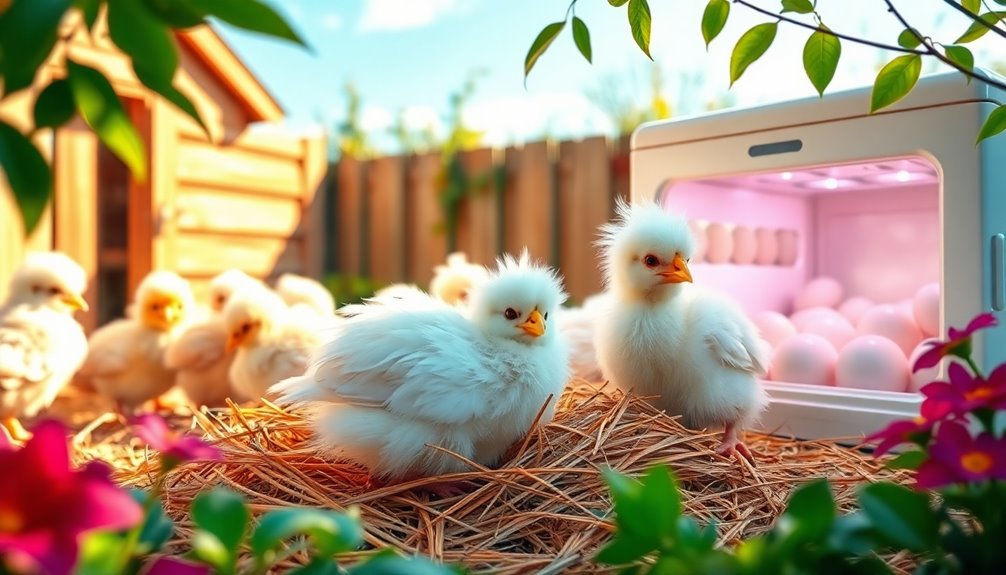
When it comes to breeding and incubating Silkies, understanding their natural instincts can greatly enhance your success. These hens are naturally broody and prefer to hatch their eggs, making them perfect for incubating eggs from other breeds too. For ideal hatching, monitor humidity levels and be prepared for a 21-day incubation period. Here's a quick reference table for your breeding and hatching efforts:
| Factor | Ideal Condition | Notes |
|---|---|---|
| Clutch Size | 5 to 10 eggs | Monitor closely for health |
| Candling | Day 7 | Check for embryo development |
| Equipment Quality | High | Guarantees better hatch rates |
Housing and Diet Needs
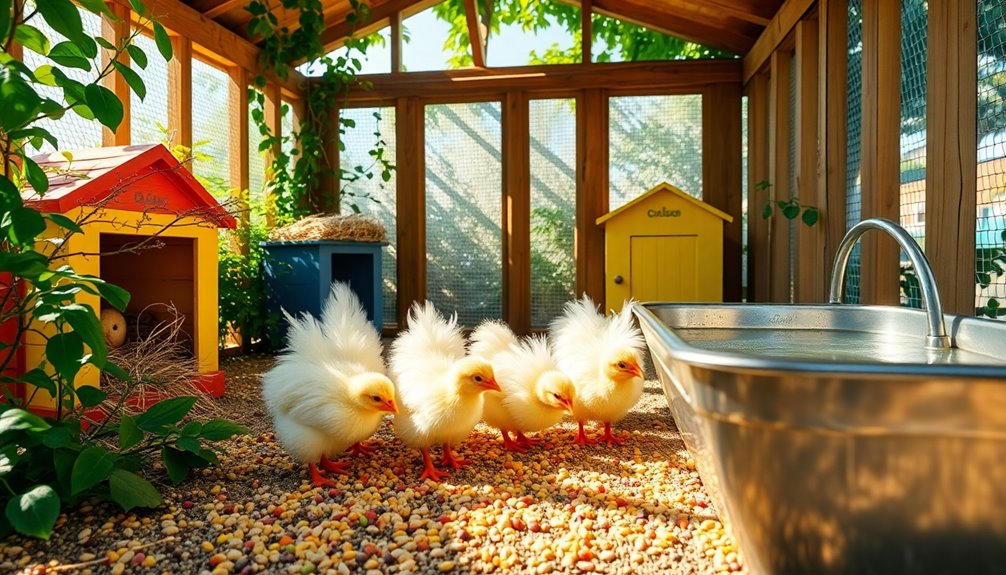
Providing adequate housing and a balanced diet is essential for keeping your Silkies healthy and thriving. Start by ensuring they've a sturdy coop made of timber and galvanized wire mesh, with enough space—3-4 square feet per bird inside and 8-10 square feet in the run.
Since their fluffy feathers aren't waterproof, proper shelter is vital in wet conditions.
Here's how to meet their dietary needs:
- Feed chicks a 21% Starter Feed until 8 weeks old.
- Switch to 18% Grower Feed until they lay their first eggs.
- Shift to 16% Layer Feed for their adult life.
- Always provide fresh water and occasional treats like Scratch and Oyster Shell for ideal health.
Handling and Socialization
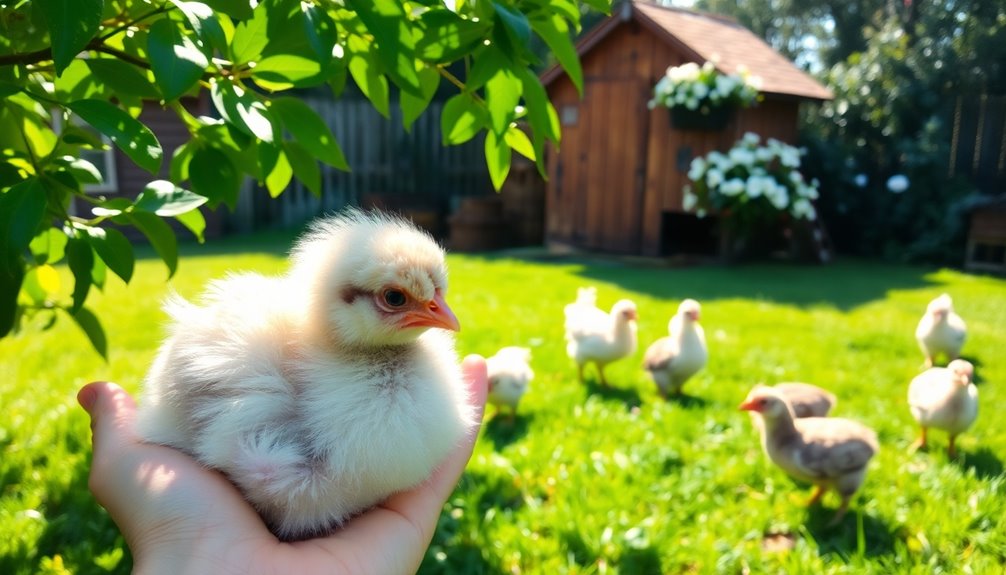
Handling and socialization are essential for your Silkies' well-being and comfort around humans. Start handling your Silkies from a young age to help them get used to human interaction, which reduces anxiety.
Speak softly and consistently during these sessions to create a calming atmosphere, allowing them to associate your voice with positive experiences. Use treats like cheese balls or healthy options such as lettuce as positive reinforcement to encourage friendly behavior and build trust.
Pay attention to the social dynamics within the flock; understanding each Silkie's comfort level can improve the taming process.
Resources for Silkie Enthusiasts
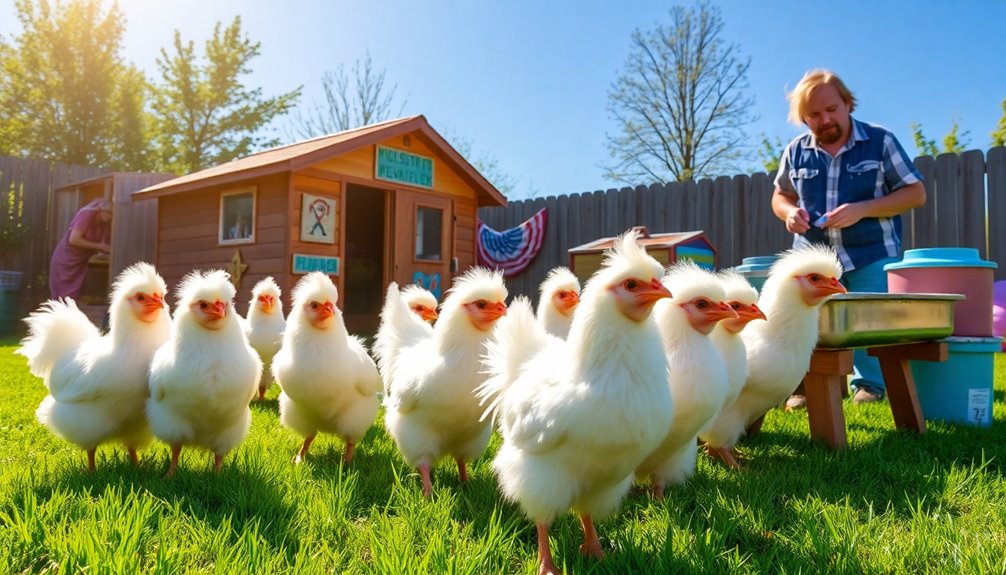
For Silkie enthusiasts, a wealth of resources exists to deepen your knowledge and enhance your experience with these unique birds. Here are some valuable options:
- The Silkie Club of North America: This organization provides breed standards and guidelines for showing Silkies, plus a community of fellow enthusiasts.
- Reputable Breeders: Find high-quality purebred Silkies through trusted online platforms, ensuring your Backyard Chicken flock is exceptional.
- UK Facebook Group: Join local groups to buy, sell, and connect with other Silkie lovers, fostering a supportive network.
- Storey's Illustrated Guide to Poultry Breeds: This book offers an in-depth look at Silkies, making it essential for understanding their unique characteristics, including hatching eggs.
Additionally, consider exploring color accuracy in poultry photography to showcase your Silkies' vibrant feathers effectively.
These resources will help you thrive as a Silkie enthusiast!
Frequently Asked Questions
How to Keep Silkies Healthy?
To keep your Silkies healthy, start with regular health checks to catch issues like lice or illness early.
Make certain they're eating a balanced diet rich in protein, seeds, grains, and veggies.
Provide a dust bathing area to help control pests and maintain hygiene.
Don't forget routine worming and vaccinations to prevent diseases.
Finally, guarantee they've proper shelter to stay dry and warm, as their fluff isn't great for insulation.
Why Are Silkies Hard to Raise?
Silkies can be hard to raise due to their specific health needs and vulnerabilities.
You'll need to guarantee they're vaccinated early to protect against diseases like Marek's. Their fluffy feathers attract lice and mites, so regular health checks are vital.
Additionally, their unique feather structure requires you to provide protection from wet conditions and extreme heat, making management more challenging.
Plus, you'll need to monitor their broody behavior to avoid complications.
How Do Silkies Show Affection?
Silkies are both gentle and playful, showing affection in delightful ways.
You'll notice them following you around, keen for interaction, or cuddling close when you sit down. Their soft chattering often signals contentment, letting you know they crave companionship.
When they nuzzle against you or gently peck at your hand, it's their way of expressing trust and love.
Engaging with them regularly strengthens this bond, making your connection even deeper.
What Is the Most Sought After Silkie Chicken?
When you're considering which Silkie chicken is the most sought after, you'll find that the Black variety often tops the list. Its striking appearance, with unique black skin and bones, makes it a favorite among enthusiasts.
However, don't overlook the White Silkies, known for their classic elegance, and the rare Blue Silkies, which have become popular too.
Ultimately, it depends on personal taste and what appeals to you in a Silkie.
Conclusion
In the enchanting world of Silkie chickens, your flock can flourish with a little love and care. By embracing their unique personalities and providing the right environment, you'll watch these fluffy beauties thrive like blossoms in spring. Remember, every interaction is a chance to deepen your bond, making each day a delightful adventure. So, sprinkle your journey with patience and joy, and soon you'll find that raising Silkies isn't just a hobby—it's a heartwarming experience.

